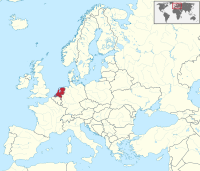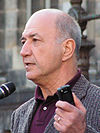Portal:Netherlands
Netherlands portal

|

|

| |
The Netherlands, informally Holland, is a country in Northwestern Europe, with overseas territories in the Caribbean. It is the largest of the four constituent countries of the Kingdom of the Netherlands. The Netherlands consists of twelve provinces; it borders Germany to the east and Belgium to the south, with a North Sea coastline to the north and west. It shares maritime borders with the United Kingdom, Germany, and Belgium. The official language is Dutch, with West Frisian as a secondary official language in the province of Friesland. Dutch, English, and Papiamento are official in the Caribbean territories.
The Netherlands has been a parliamentary constitutional monarchy with a unitary structure since 1848. The country has a tradition of pillarisation (separation of citizens into groups by religion and political beliefs) and a long record of social tolerance, having legalised prostitution and euthanasia, along with maintaining a liberal drug policy. The Netherlands allowed women's suffrage in 1919 and was the first country to legalise same-sex marriage in 2001. Its mixed-market advanced economy has the eleventh-highest per capita income globally. The Hague holds the seat of the States General, Cabinet, and Supreme Court. The Port of Rotterdam is the busiest in Europe. Schiphol is the busiest airport in the Netherlands, and the fourth busiest in Europe. Being a developed country, the Netherlands is a founding member of the European Union, Eurozone, G10, NATO, OECD, and WTO, as well as a part of the Schengen Area and the trilateral Benelux Union. It hosts intergovernmental organisations and international courts, many of which are in The Hague. (Full article...)
Selected article
Pillarisation (Verzuiling in Dutch, Pilarisation in French) is a term used to describe the way the Dutch and Belgians used to deal with their multicultural (but not multiethnic) societies. Society was "vertically" divided in several smaller segments or "pillars" according to different religions or ideologies, which operated separately from each other. Austrian and Maltese societies were other examples of this phenomenon.
These pillars all had their own social institutions: their own newspapers, broadcasting organisations, political parties, trade unions, schools, hospitals, building societies, universities, scouting organisations and sports clubs. Some companies even only hired personnel of a specific religion or ideology. This led to a situation where many people had no personal contact with people from another pillar.
Selected picture
| This page is currently inactive and is retained for historical reference. Either the page is no longer relevant or consensus on its purpose has become unclear. To revive discussion, seek broader input via a forum such as the village pump. |

Keukenhof, situated in Lisse, Netherlands, also known as the Garden of Europe, is the world's largest flower garden. Keukenhof is open from the last week of March to mid-May. In 1949, the then-mayor of Lisse proposed a flower exhibition where growers from all over the Netherlands and Europe could exhibit their hybrids. The best time to view the tulips is around mid-April, depending on the weather. It is located between the towns of Hillegom and Lisse, south of Haarlem in North Holland, southwest of Amsterdam, and is accessible by bus from the stations of Haarlem or Leiden.
Did you know
| This Wikipedia page has been superseded by Portal:Netherlands and is retained primarily for historical reference. |
| Note: Did you know entries are now being transcluded directly on the main portal page. However, this page should be retained for historical reference. |

- ... that Dutch Nuna solar racing team, guided by former Space Shuttle astronaut Wubbo Ockels (pictured) won the World Solar Challenge six times out of the last eight events ?
- ... that The Hague is home to over 150 international organisations (including NGOs) working in the field of peace and justice ?
- ... the Netherlands is a very densely populated country for its size ? With 406 people per km² – or 498 if inland waters are excluded – only Bangladesh, South Korea and Taiwan have both a larger population and a higher population density.
- ... the Netherlands is nevertheless the world's second largest exporter of food and agriculture products, after the United States ?
- ... and that it has the most plentiful, nutritious and healthy food, according to a 2014 comparison of 125 countries by Oxfam ?
- ... a UNICEF report published in 2007 ranked the Netherlands as the best country for children to live in ?
- ... the Netherlands also exports more flowers and flower bulbs than the rest of the world combined ?
- ... the KLM is the longest running national airline in the world ?
- ... the Port of Rotterdam was the world's busiest port from 1962–2002, and is now still the world's largest seaport outside of East Asia, measured by total cargo tonnage handled ?
- ... that two major clusters of flood control and land reclamation projects: the Delta Works and the Zuiderzee Works, were declared one of the Seven Wonders of the Modern World by the American Society of Civil Engineers. ?
- ... of which the Maeslantkering storm surge barrier is one of the largest moving structures on Earth ?
- ... of which the 1932 Afsluitdijk is still one of the world's longest dams and causeways ?
- ... and of which the Flevopolder, at an area of 970 km² (370 sq. mi), is by far the world's largest artificial island ?
Netherlands News
Things you can do

The Dutch Wikiportal is currently under construction. Help would be greatly appreciated!
See also:
Add yourself to the category of Wikipedians located in the Netherlands.
Wikiprojects

|
You are invited to participate in the WikiProject Netherlands, a WikiProject dedicated to developing and improving articles about the Netherlands. |

